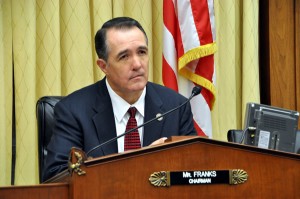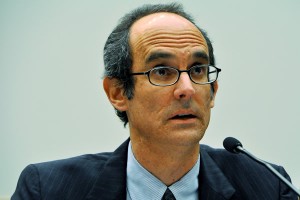Living
Tough questioning for Gallagher at marriage hearing
Democratic lawmakers hammer anti-gay activist

Democratic lawmakers on Friday hammered anti-gay activist Maggie Gallagher during a congressional hearing with questions on why same-sex couples should be excluded from marriage and the extent to which the National Organization for Marriage participated in campaigns to rescind state marriage laws.
In testimony before the House Judiciary subcommittee on the Constitution, Gallagher, NOM’s chair and co-founder, said marriage should restricted to one man and one woman because such unions are the only kind that can produce children and because state voters by referenda have affirmed 31 times that marriage shouldn’t be extended to gay couples.
“Marriage is the union of husband and wife for a reason: these are the only unions that create new life and connect those children in love to their mother and father,” Gallagher said. “This is not necessarily the reason why individuals marry; this is the great reason, the public reason why government gets involved in the first place.”
The hearing, which was titled “Defending Marriage,” took place on the heels of President Obama’s announcement on Feb. 23 that the Defense of Marriage Act is unconstitutional and that his administration would no longer defend the anti-gay law against litigation in court. Following a 3-2 party-line vote in March by the Bipartisan Legal Advisory Council, U.S. House Speaker John Boehner (R-Ohio) directed the House general counsel to take up defense of DOMA in place of the administration.
Gallagher said the need to raise children by married parents of opposite genders affirms the rationale for having in place DOMA, the 1996 law that prohibits recognition of same-sex marriage, and criticized the Justice Department for dropping defense of the law.
“This is the rationale for the national definition of marriage proposed by Congress in passing DOMA: ‘civil society has an interest in maintaining and protecting the institution of heterosexual marriage because it has a deep and abiding interest in encouraging responsible procreation and child-rearing,'” Gallagher said. “If we accept, as DOMA explicitly does, that this is a core public purpose of marriage, then treating same-sex unions as marriage makes little sense.”
Following her opening statement, Gallagher bore the brunt of tough questioning from Democratic lawmakers during the question-and-answer session of the hearing.
Rep. Jerrold Nadler (D-N.Y.), ranking Democrat on the subcommittee, asked Gallagher if the children of Jen and Dawn BarbouRouske, a married same-sex couple from Iowa who were present during the hearing, should have parents who can receive the full protections of marriage or if she considers these children “expendable.”
“I think no children are expendable,” Gallagher replied. “Gay people have families that are not marital families, but they are families. I myself was an unwed mother, so I have firsthand experience with being in a family that’s not a marital family. I don’t think you need to have a message of stigmatization and exclusion to protect to an ideal.”
Nadler, sponsor of DOMA repeal legislation in the House, interrupted Gallagher, saying “the whole point” of DOMA is stigmatization and exclusion, and pressed Gallagher further on why the institution of marriage benefits when same-sex couples are excluded.
“Because including same-sex unions as marriages denies at a public level that marriage is about an important way for getting together mothers and fathers and children,” Gallagher said.
Nadler continued to question Gallagher on NOM’s involvement in 2010 Iowa campaign that successfully ousted three justices from the state Supreme Court who ruled in favor of same-sex marriage. The lawmaker asked Gallagher, who estimated that NOM contributed between $600,000 and $650,000 to the campaign, why she would criticize the Justice Department for allegedly making a political decision while her organization politicized the judicial process.
“The National Organization of Marriage is political advocacy organization, and so I think it’s appropriate for us to be politically involved in ways that Department of Justice is not,” Gallagher replied.
Rep. John Conyers (D-Mich.), a co-sponsor of the DOMA repeal bill, asked Gallagher whether reports were true that her organization contributed $1.9 million to the 2009 campaign in Maine to abrogate the states’s same-sex marriage law. Opponents of same-sex marriage succeeded in nullifying the marriage law in the state before gay couples could marry there.
“I don’t have those figures in front of me, but we were involved in the [effort],” Gallagher said. “But that’s probably on the order [of our contributions].”
NOM has repeatedly come under fire for failing to disclose their donors during the campaign against the Maine marriage law. State courts have ordered the organization to reveal their donors in accordance with the law, but NOM has yet to do so.
Following the hearing, Dan Fotou, eastern regional field director for GetEQUAL, praised Democratic lawmakers for hammering Gallagher with tough questions after her testimony.
“I think it was good to hear the Democrats standing up and challenging Maggie Gallagher’s position,” Fotou said. “Fifty-two percent of Americans think that marriage equality is OK, so I think today was good in terms of putting a face on hate once again, and Maggie does a really great job of that.”
Democratic lawmakers’ criticisms during the hearing weren’t limited to Gallagher. Conyers questioned Rep. Trent Franks (R-Ariz.), chair of the subcommittee, why no witnesses from the Justice Department were present to defend Obama’s decision to drop defense of DOMA.
“What bothers me about this hearing at this subcommittee is that the Department of Justice is not present,” Conyers said. “I was informed that they were not invited. … We have one of the leaders of the country, Ms. Gallagher, who’s raised hundreds of thousands of dollars against judges … but there’s nobody here from the Justice Department.”
In response, Franks said the Justice Department would be invited to come during an upcoming hearing in May before the House Oversight & Government Reform Committee on the DOMA decision. Upon further questioning, Franks maintained the panel was fair because its makeup included witnesses on both sides of the issue.
But Franks’ response apparently didn’t allay the concerns of Conyers, who said he hopes Congress can hear the Justice Department to respond to the criticisms of Gallagher.
“There’s a political tone in this hearing that I want to diminish as much as possible,” Conyers said. “The fact of the matter is this is not in regular order and I do not approve the way that we’re starting out this subcommittee [hearing].”
Despite the general tone in favor of DOMA during the hearing, several panel members known for having anti-gay views — including Rep. Steve King (R-Iowa), who’s railed against same-sex marriage in home state, and Rep. Jim Jordan (R-Ohio), who’s leading the effort to eliminate gay nuptials in D.C. — didn’t make an appearance. Neither the office for King nor Jordan responded to the Washington Blade’s request to comment on why the lawmakers didn’t attend the hearing.
Ian Thompson, who’s gay and legislative representative for the American Civil Liberties Union, said the lack of presence by anti-gay lawmakers was telling that the they were uncomfortable with their positions.
“The thing that was particularly striking to me was the fact that so few DOMA supporters on the committee actually were in attendance,” Thompson said. “So, from my perspective, if the hearing was intended to demonstrate the support of the House of Representatives for DOMA, from the attendance alone, it was a complete and total flop.”
But a few anti-gay Republicans did make an appearance to rebuke the notion of extending marriage rights to gay couples and to criticize the Justice Department for dropping defense of DOMA.
Franks called Obama’s decision to discontinue defense of the anti-gay law an “edict” that “failed to show the caution and respect for Congress and the courts.”
“When the President unilaterally declares a duly enacted law unconstitutional, he cuts Congress and the American people out of the lawmaking process,” Franks said. “Such heavy-handed presidential action undermines the separation of powers and the principle that America is a constitutional republic predicated on the rule of law.”
Franks continued that the arguments in favor of DOMA are “reasonable and right” because marriage between one man and one woman is the best union for raising children.
“Traditional marriage has proven to be the most successful institution in humanity’s history for the propagation and preparation of the next generation,” Franks said. “The traditional family has proven to be the best department of welfare, the best department of education, the best department of crime prevention, and the best department of economic security that there has ever been.”
Rep. Lamar Smith (R-Texas), a lawmaker known for anti-gay views, also made an appearance at the hearing and railed against what he called the government altering the definition of marriage. Smith, chair of the full House Judiciary Committee, offered an opening statement during the hearing even though he’s not a member of the subcommittee.
“If we tamper with the definition of marriage, harmful unintended consequences could follow,” Smith said. “The ability of religious institutions to define marriage for themselves to promote their sincerely held beliefs could be threatened.”
Smith said the will the people is for continued definition of marriage between one man and one woman — noting the 31 successful ballot initiatives that restricted marriage to such unions — and said the U.S. Constitution doesn’t provide protections for same-sex couples seeking to marry.
“No one can seriously believe that the Constitution’s founders intended to create a right to same-sex marriage,” Smith said. “By refusing to defend the Defense of Marriage Act against legal challenges, the administration has allowed the courts to overrule that popular law.”
Franks and Smith’s opening statements were countered by initial remarks from Nadler, who called arguments that Justice Department acted inappropriately by dropping defense of DOMA a “red herring” and said the real question should be whether anyone — either the Obama administration or Congress — should defend the law.
“Far from demeaning, trivializing or destroying the institution of marriage, [gay] couples have embraced this time-honored tradition and the commitment and serious legal duties of marriage,” Nadler said. “Rather than defending DOMA in court, Congress should be working to repeal it.”
Two legal experts on the panel presented opposing views on whether the administration acted within bounds in its decision to discontinue defense of DOMA in court.
Edward Whelan, president of the Ethics & Public Policy Center, said the Justice Department’s decision is in violation of its policy.
“The Obama administration’s decision to abandon defense of DOMA — or more precisely, to abandon its charade of pretending to defend DOMA — departs sharply from the Department of Justice’s long-standing practice,” Whelan said.
Whelan said Obama dropped defense of the anti-gay law to appease a political constituency and to induce the courts to “invent the constitutional right to same-sex marriage.”
“With the exception of laws that intrude on the executive branch’s power, the long-standing practice of the Department of Justice is to vigorously defend the constitutionality of any law where a reasonable may be made,” Whelan said. “This ‘reasonable standard’ is a very low bar. It basically means that the Department of Justice will defend a federal law against constitutional challenge when it can offer non-frivolous grounds in support of the law.”
But Carlos Ball, a gay law professor from Rutgers Law School, testified that Obama acted within his authority because another statute exists saying that the attorney general must inform Congress if the administration decides to no longer defend a law.
“The existence of that statute seems to be a recognition by the Congress of the reality that the executive branch sometimes, in rare cases, can not defend the constitutionality of a law,” Ball said. “The executive branch, as a co-equal branch of government, has the authority and obligation to make independent assessment’s regarding a law’s constitutionality.”
Ball noted precedent for an administration declaring an existing law unconstitutional and dropping defense of the statute in court — the 1990 case of Metro Broadcasting v. FCC. Then-acting U.S. Solicitor General John Roberts, now Chief Justice of the U.S. Supreme Court, argued that a law providing for minority preferences in broadcast licensing was unconstitutional. Despite the position of the Bush administration, the Supreme Court later upheld the law.

Valentine’s Day is often portrayed as a celebration of romantic love — flowers, chocolates, and candlelit dinners. But for many LGBTQ+ individuals and couples, Valentine’s Day can also be a moment to reflect on something deeper: the love that creates a safe, welcoming home.
For LGBTQ+ home buyers and sellers, homeownership is more than a financial milestone—it is an act of belonging, resilience, and pride. Owning a home can mean finally having a place where you can hold hands with your partner on the front porch, decorate with your authentic style, and build a life free from judgment. In this way, buying or selling a home is one of the most meaningful love stories many LGBTQ+ people will ever write.
This Valentine’s Day, whether you’re a first-time gay home buyer, a same-sex couple upgrading your space, or an LGBTQ+ seller moving on to your next chapter, it’s worth thinking about how love, identity, and real estate intersect—and how to navigate that journey with confidence, protection, and the right support.
Love, Identity, and the Meaning of ‘Home’
For generations, LGBTQ+ people were denied equal access to housing, homeownership, and legal protections. Even today, many LGBTQ+ home buyers still face subtle bias, uncomfortable interactions, or outright discrimination in the real estate process.
That’s why finding LGBTQ+ friendly real estate and an affirming gay friendly realtor or lesbian realtor matters so much. A home isn’t just a building—it’s a personal sanctuary. Working with LGBTQ+ real estate agents who understand your lived experience can make all the difference between a stressful transaction and a joyful one.
For over 30 years, GayRealEstate.com has been the leading gay real estate network, connecting LGBTQ+ home buyers and sellers with gay real estate agents, lesbian real estate agents, and LGBTQ+ friendly realtors who truly “get it.” Their mission has always been simple yet powerful: to ensure that every LGBTQ+ person has access to safe, respectful, and inclusive real estate services.
Finding Your Match: Choosing the Right LGBTQ+ Friendly Realtor
Much like dating, finding the right real estate agent is about compatibility, trust, and communication. Here are some key tips for choosing the best LGBTQ+ real estate representation:
- Look for experience with LGBTQ+ clients. Search for a gay realtor near me or lesbian realtor near me through GayRealEstate.com, where agents are vetted for cultural competency and community commitment.
- Ask about their experience with same-sex couple home buying. A strong agent should understand issues like joint ownership, legal protections, and financing considerations.
- Choose someone who listens. You should feel safe sharing your priorities—whether that includes proximity to LGBTQ+ nightlife, affirming schools, or lesbian-friendly neighborhoods.
- Prioritize respect and transparency. Your agent should advocate for you, not just push a quick sale.
The right gay friendly real estate agent isn’t just helping you buy a house—they’re helping you find a place to build your life.
Best Cities for LGBTQ+ Home Buyers
If love is your compass, location is your map. Some of the best cities for LGBTQ+ home buyers consistently offer strong community presence, legal protections, and welcoming neighborhoods:
- Wilton Manors, Florida – A hub for LGBTQ+ culture with thriving LGBTQ+ real estate opportunities
- Palm Springs, California – A long-standing LGBTQ+ retirement and second-home destination
- Provincetown, Massachusetts – Historic LGBTQ+ community with progressive housing protections
- Asheville, North Carolina – Growing market with inclusive real estate services
- Fort Lauderdale, Florida – Diverse, welcoming, and highly sought-after for LGBTQ+ home ownership
Working with GayRealEstate.com allows you to connect with local LGBTQ+ real estate experts who know these markets inside and out.
Navigating Legal Protections in LGBTQ+ Real Estate
Love is universal—but legal protections are not always consistent. Understanding your rights is essential when buying or selling a home as an LGBTQ+ person.
Key protections include:
- Fair Housing Act (FHA): Prohibits discrimination based on sex, which courts have increasingly interpreted to include sexual orientation and gender identity.
- State and local protections: Many cities and states offer additional safeguards against LGBTQ+ housing discrimination.
- Same-sex couple legal considerations: If you are married, joint ownership is typically straightforward. If not, consult an attorney about co-ownership agreements.
A knowledgeable LGBTQ+ friendly realtor from GayRealEstate.com can help guide you through these complexities and connect you with trusted legal professionals when needed.
Buying a Home as an LGBTQ+ Person: Practical Tips
If you’re embarking on your home-buying journey this Valentine’s season, here are smart, practical steps to take:
- Clarify your priorities. Do you want a vibrant LGBTQ+ neighborhood, quiet suburbs, or access to queer community spaces?
- Get pre-approved for a mortgage. This strengthens your position in competitive markets.
- Work with an LGBTQ+ real estate agent. Searching “finding a gay real estate agent” or “finding a lesbian real estate agent” through GayRealEstate.com is a great first step.
- Research inclusive communities. Some neighborhoods are more welcoming than others.
- Know your rights. If you experience bias, document it and seek legal guidance.
Buying a home is an act of self-love—and community love.
Selling a Home as an LGBTQ+ Person
Selling can be just as emotional as buying, especially if your home represents years of memories with your partner, friends, or chosen family.
When selling a home as an LGBTQ+ person, consider:
- Working with a gay friendly realtor who will market your home inclusively
- Highlighting LGBTQ+ community appeal in listings
- Being prepared for potential buyer bias (and knowing how to respond)
- Leaning on GayRealEstate.com’s LGBTQ+ real estate services for trusted guidance
Your story—and your home—deserve respect.
Real Estate for LGBTQ+ Families
More LGBTQ+ couples are raising children, fostering, or building blended families. This makes homeownership even more meaningful.
When searching for real estate for LGBTQ+ families, consider:
- LGBTQ+ affirming school districts
- Family-friendly queer communities
- Safe neighborhoods with inclusive values
- Access to LGBTQ+ resources and social networks
GayRealEstate.com specializes in helping LGBTQ+ families find homes that truly fit their lives.
Love, Pride, and Homeownership
At its core, Valentine’s Day is about connection. For LGBTQ+ people, homeownership can be one of the most profound expressions of love—love for yourself, your partner, your family, and your future.
Whether you are a first-time gay home buyer, a same-sex couple relocating, or an LGBTQ+ seller moving forward, you deserve an experience rooted in dignity, fairness, and celebration.
For over three decades, GayRealEstate.com has stood as the leading source for LGBTQ+ real estate, gay real estate, lesbian real estate, and LGBTQ+ home buying and selling representation. Their nationwide network of gay real estate agents, lesbian-friendly real estate agents, and LGBTQ+ friendly realtors ensures that your real estate journey is guided by professionals who understand your heart—and your home.
This Valentine’s Day, let your next chapter be written in a place where you can truly belong. Because when love leads the way, home is never far behind.
Scott Helms is president and owner of Gayrealestate.com.

Dear Michael,
I keep getting rejected on the apps. I don’t want to put myself out there anymore.
I don’t understand gay men. I think they behave really badly.
Guys stop replying in the middle of a text conversation and then un-match me. Guys don’t show up when we make a plan to meet. After a date or even a hookup that it seems clear we both enjoyed, I never hear from the guy again.
I am a pretty good looking and successful guy. I’m not a model or a billionaire but I’m sincerely wanting to date and eventually share a life with someone.
Unfortunately, everyone I am meeting, even if they say they have similar aspirations for a partner, acts like they’re looking over my shoulder for something better, and drops me for I-don’t-know-what reason.
I don’t have a lot of trust in the sincerity of gay men.
I know I sound bitter but I’ve been at this for a while and it keeps happening.
I know there’s a saying that if it keeps happening to you, you must be the problem. Logically that makes sense.
Except, I think this keeps happening so often and so predictably that it’s not me. These people hardly know me. It’s more along the lines of, if everything about me isn’t exactly what they want, or some little thing that I say, think, or do offends them, they vanish.
I’m lonely, but what’s out there is awful. Maybe it’s best to not keep trying.
If you have a different way of seeing it that’s honest, not just some fluff to make me feel better and be hopeful, please enlighten me.
Michael replies:
I agree with you, there is a lot of this kind of behavior out there. I hear stories similar to yours all the time. Though people do find great relationships online, relying on apps to meet a partner can be tricky.
Hookup apps have little to do with any kind of real connection. Often, they don’t even have much to do with sex. For a lot of people, they’re more about trying to fill up some kind of emptiness and seeking validation. They also, obviously, objectify men, which is the opposite experience of what you’re seeking.
And dating apps lend themselves to a sort of takeout menu concept of dating. You get to specify exactly what you’re looking for—a little of this, a lot of that, please omit something else—and then believe you should get what you ordered. As if that really exists. And when something isn’t just what you wanted, forget it.
But life doesn’t work that way. Nor do people: You can enter the exact criteria for the man of your dreams, but he will surprise you or let you down at times in some major ways. That’s how it goes. Part of being in a relationship is accepting that we all have to deal with imperfection.
All that said, hordes of people are going to keep using all sorts of apps and keep looking for “perfect” partners and keep ditching perfectly fine guys for the most minuscule of reasons.
But that doesn’t mean that you have to stay on the apps if it’s demoralizing you and leaving you hopeless.
Before you sign off, perhaps you would like to have some fun and be creative. Just for example, you could write in your profile that you’re interested in meeting a guy who isn’t looking for perfection and is looking for a decent soul rather than a set of stats. You still might encounter a lot of guys who ghost you for no apparent reason, but you also might have some luck finding a sincere someone with relationship goals that are similar to yours.
Another, complimentary strategy: Toughen up your attitude to stop letting let these rejections get under your skin. They have little to do with who you are (unless you are oblivious to some major issue about yourself), so you needn’t take them personally. In other words, expect this to keep happening; and when it does, laugh and keep moving forward.
I understand you are feeling like giving up on gay men in general. Keep in mind that while there are a lot of reasons why many gay men focus more on sex and less on commitment, that isn’t true across the board. In my work over the years, I have met many gay men who are looking for what you’re seeking. You could strive to be hopeful that if you keep looking, you are likely to cross paths with some of them.
And where you look may play a role.
Whether or not you stay on the apps, I suggest you seek additional ways to meet a potential boyfriend. Before apps existed, people did find other ways to meet romantic partners, and these ways do still exist. I know that this path is not an easy one. The whole dating endeavor isn’t easy. But difficult is not impossible.
There are social and activity groups for gay men that are organized around some sort of shared interest. They aren’t overtly sexual, so often attract people who are interested in and looking for a deeper connection. Even if you don’t meet a boyfriend there, you might make some like-minded friends, and one thing may lead to another in all sorts of ways.
There’s also plenty you can do as a human being (not simply as a gay man) in the offline world that might interest and even uplift you, where you just might meet a man you like. Again, you might also simply make some friends, and through having a bigger social life, might ultimately meet your guy.
Simply put: Don’t let yourself feel like or be a victim. Don’t keep putting yourself in miserable situations. And figure out what it means for you to do your best to make what you’d like to happen, happen.
Michael Radkowsky, Psy.D. is a licensed psychologist who works with couples and individuals in D.C., Maryland, Virginia, and New York. He can be found at michaelradkowsky.com. All identifying information has been changed for reasons of confidentiality. Have a question? Send it to [email protected].
Real Estate
New year, new housing landscape for D.C. landlords
Several developments expected to influence how rental housing operates

As 2026 begins, Washington, D.C.’s rental housing landscape continues to evolve in ways that matter to small landlords, tenants, and the communities they serve. At the center of many of these conversations is the Small Multifamily & Rental Owners Association (SMOA), a D.C.–based organization that advocates for small property owners and the preservation of the city’s naturally occurring affordable housing.
At their December “DC Housing Policy Summit,” city officials, housing researchers, lenders, attorneys, and housing providers gathered to discuss the policies and proposals shaping the future of rental housing in the District. The topics ranged from recent legislative changes to emerging ballot initiatives and understanding how today’s policy decisions will affect housing stability tomorrow.
Why Housing Policy Matters in 2026
If you are a landlord or a tenant, several developments now underway in D.C., are expected to influence how rental housing operates in the years ahead.
One of the most significant developments is the Rebalancing Expectations for Neighbors, Tenants and Landlords (RENTAL) Act of 2025, a sweeping piece of legislation passed last fall and effective December 31, 2025, which updates a range of housing laws. This broad housing reform law will modernize housing regulations and address long-standing court backlogs, and in a practical manner, assist landlords with shortened notice and filing requirements for lawsuits. The Act introduces changes to eviction procedures, adjusts pre-filing notice timelines, and modifies certain tenant protections under previous legislation, the Tenant Opportunity to Purchase Act.
At the same time, the District has expanded its Rent Registry, to have a better overview of licensed rental units in the city with updated technology that tracks rental units subject to and exempt from rent control and other related housing information. Designed to improve transparency and enforcement, Rent Registry makes it easier for all parties to verify rent control status and compliance.
Looking ahead to the 2026 election cycle, a proposed ballot initiative for a two-year rent freeze is generating significant conversation. If it qualifies for the ballot and is approved by voters, the measure would pause rent increases across the District for two years. While still in the proposal phase, it reflects the broader focus on tenant affordability that continues to shape housing policy debates.
What This Means for Rental Owners
Taken together, these changes underscore how closely policy and day-to-day operations are connected for small landlords. Staying informed about notice requirements, registration obligations, and evolving regulations isn’t just a legal necessity. It’s a key part of maintaining stable, compliant rental properties.
With discussions underway about rent stabilization, voucher policies, and potential rent freezes, long-term revenue projections will be influenced by regulatory shifts just as much as market conditions alone. Financial and strategic planning becomes even more important to protect your interests.
Preparing for the Changes
As the owner of a property management company here in the District, I’ve spent much of the past year thinking about how these changes translate from legislation into real-world operations.
The first priority has been updating our eviction and compliance workflows to align with the RENTAL Act of 2025. That means revising how delinquent rent cases are handled, adjusting notice procedures, and helping owners understand how revised timelines and court processes may affect the cost, timing, and strategy behind enforcement decisions.
Just as important, we’re shifting toward earlier, more proactive communication around compliance and regulatory risk. Rather than reacting after policies take effect, we’re working to flag potential exposure in advance, so owners can make informed decisions before small issues become costly problems.
A Bigger Picture for 2026
Housing policy in Washington, D.C., has always reflected the city’s values from protecting tenants to preserving affordability in rapidly changing neighborhoods. As those policies continue to evolve, the challenge will be finding the right balance between stability for renters and sustainability for the small property owners who provide much of the city’s housing.
The conversations happening now at policy summits, in Council chambers, and across neighborhood communities will shape how rental housing is regulated. For landlords, tenants, and legislators alike, 2026 represents an opportunity to engage thoughtfully, to ask hard questions, and to create a future where compliance, fairness, and long-term stability go hand-in-hand.
-

 Health5 days ago
Health5 days agoCMS moves to expand HIV-positive organ transplants
-

 State Department4 days ago
State Department4 days agoFOIA lawsuit filed against State Department for PEPFAR records
-

 Opinions4 days ago
Opinions4 days agoTrans sports bans rooted in eugenics
-

 India4 days ago
India4 days agoTrans students not included in new India University Grants Commission equity rules























